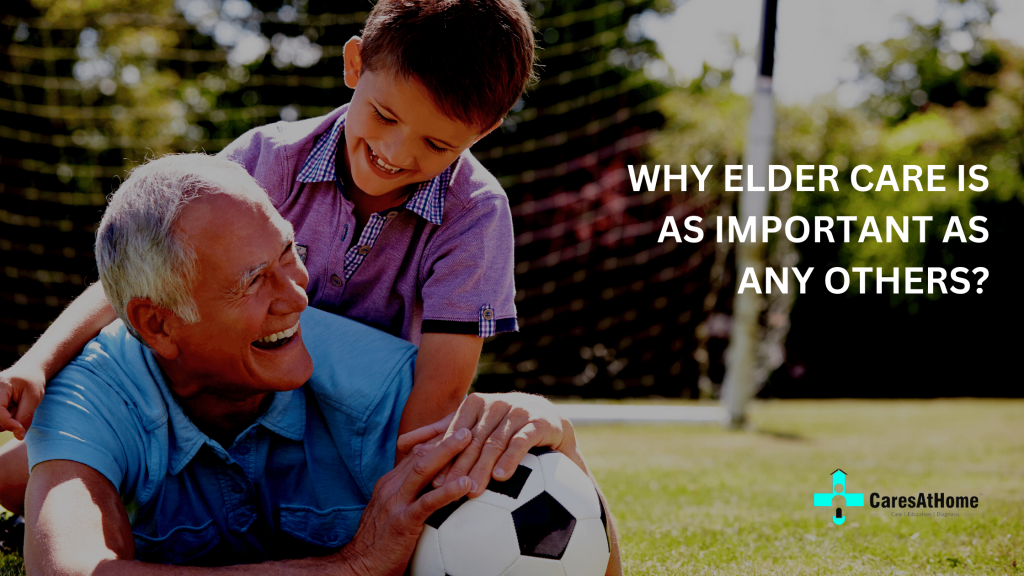Elder care is a vital component of a caring and compassionate society, just as important as childcare or healthcare for other age groups. As people age, they face physical, emotional, and social changes that require special attention. Elder care focuses on ensuring older adults live dignified, healthy, and fulfilling lives as they face the natural challenges of aging. Here are several reasons why elder care is as important as any other type of care:
1. Ensuring Dignity and Quality of Life
As people grow older, their ability to perform daily tasks may diminish due to age-related physical or mental conditions. Elder care plays a critical role in helping seniors maintain their independence and dignity.
- Assistance with Daily Activities: Tasks like dressing, bathing, cooking, and mobility can become challenging. Elder care services provide support in these areas, allowing older adults to live with self-respect and comfort.
- Respecting Individual Preferences: Elder care ensures that seniors’ preferences and personal routines are honored, whether they are in a nursing home, assisted living facility, or receiving home care.
2. Addressing Health and Medical Needs
Aging often brings about chronic health conditions, decreased mobility, or cognitive decline. Elder care ensures that these medical needs are managed appropriately.
- Chronic Disease Management: Many seniors suffer from conditions such as heart disease, diabetes, arthritis, or Alzheimer’s. Regular monitoring, medication management, and therapies provided through elder care can prevent complications and improve quality of life.
- Nutritional Support: Proper nutrition is critical for elderly individuals, as malnutrition can lead to weakened immune systems and increased frailty. Elder care includes dietary planning to ensure they receive the necessary nutrients.
3. Providing Emotional and Social Support
Social isolation and loneliness are common challenges for older adults, especially if they live alone or have lost close friends or spouses. Elder care helps address these emotional and psychological needs.
- Combating Loneliness: Elder care services often provide companionship, offering emotional support and social interaction. This is key in preventing depression and other mental health issues.
- Engagement in Social Activities: Elder care often involves organizing activities and events, helping seniors remain socially active and engaged, which is beneficial for their mental health and well-being.
4. Reducing the Burden on Families
Family members often take on the role of caregivers for their elderly loved ones. However, caregiving can be emotionally and physically taxing, especially when balancing work, personal life, and caregiving responsibilities.
- Relieving Family Stress: Professional elder care services provide much-needed support for family caregivers, offering respite care, daily assistance, or even long-term care solutions.
- Expert Care: Trained caregivers have the knowledge and experience to handle complex situations, such as managing dementia or chronic illnesses, giving family members peace of mind.
5. Protecting Against Elder Abuse
Elder abuse, whether physical, emotional, or financial, is an unfortunate reality in some cases. Proper elder care can help protect vulnerable seniors from abuse and neglect.
- Trained Caregivers: Elder care providers are trained to identify signs of abuse and take necessary steps to protect the well-being of the elderly.
- Safe Environments: Professional care settings or in-home services ensure that seniors live in safe, monitored environments where their rights are respected.
6. Supporting End-of-Life Care
Elder care also encompasses palliative and hospice care, providing comfort and compassion for seniors in their final stages of life.
- Pain Management and Comfort: Palliative care focuses on relieving pain and symptoms, ensuring that seniors experience comfort and dignity as they near the end of life.
- Emotional and Family Support: End-of-life care also includes emotional and psychological support for both the patient and their family, helping them navigate the challenges of this difficult time.
7. Preparing for a Growing Elderly Population
With the global population aging rapidly, elder care is becoming increasingly essential. By 2050, the number of people aged 60 and older is expected to reach 2.1 billion, making the demand for elder care services critical.
- Economic and Social Impact: An aging population puts pressure on healthcare systems, retirement homes, and social services. Prioritizing elder care helps ensure these systems can support the elderly population effectively.
- Addressing Global Aging: Countries with aging populations must invest in elder care infrastructure to meet the growing needs of seniors and ensure they are cared for with respect and dignity.
Conclusion
Elder care is as important as any other form of care because it safeguards the well-being, dignity, and quality of life of older adults. As people age, they deserve to live comfortably and safely, with access to medical care, emotional support, and social engagement. Elder care not only benefits the individual but also alleviates the burden on families and contributes to a healthier, more compassionate society. As the global population continues to age, elder care will remain a vital aspect of healthcare and community support.

